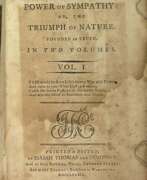Poets Sentimentalism


William Hill Brown was an 18th-century American novelist writer.
Brown apparently believed that one of the main purposes of literature was to instill some moral values. It is on this conviction that his novel The Power of Sympathy, or The Triumph of Truth-Based Nature (1789), which is considered the first American novel, is built. It caused a great scandal, however, because it is based on a real-life gruesome story of kidnapping, accidental incest, and suicide.
This novel is a prime example of the American approach to the European genre of the epistolary novel, but with lush descriptions of landscapes and a frank discussion of American slavery. This book can also be considered one of the first explicitly American works of literary criticism, containing lengthy reflections on the nature and purpose of literature and its role in moral formation, especially for women. The popularity of this work initiated the creation of many sentimental novels in the United States.
During his short life, Brown also wrote the romantic novel Harriot, or Domestic Reconciliation (1789), the play West Point Preserved (1797), a tragedy about the death of a Revolutionary spy, a series of verse fables, the West Indies-style comedy Penelope, and a second short novel about incest and seduction, Ira and Isabella.


Sarah Wentworth Apthorp Morton was an American poet of the American Revolutionary period.
Sarah received a good education and early began writing poetry, the first of which was published under the pseudonyms Constance or Philenia. Frequent publications in periodicals made Filenia a prominent American poetess of her period, critics even in Europe paid attention to her.
Sarah Morton was called "American Sappho" by her contemporaries and was considered one of the finest women poets of the 18th century. She wrote long, sentimental, narrative poems that discuss the composition of the new nation, interracial relations, and heroism, both male and female. She also wrote about the virtues of freedom.